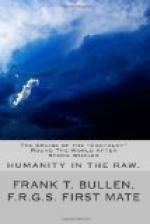Tui proved himself to be a smart harpooner, and was chosen for the captain’s boat. During our conversations, I was secretly amused to hear him allude to himself as Sam, thinking how little it accorded with his SOI-DISANT Kanaka origin. He often regaled me with accounts of his royal struggles to maintain his rule, all of which narrations I received with a goodly amount of reserve, though confirmed in some particulars by the Kanakas, when I became able to converse with them. But I was hardly prepared to find, as I did many years after, upon looking up some detail in Findlay’s “South Pacific Directory,” this worthy alluded to as “the celebrated Sam,” in a brief account of Futuna. There he was said to be king of the twin isles; so I suppose he found means to oust his rival, and resume his sovereignty; though, how an American negro, as Sam undoubtedly was, ever managed to gain such a position, remains to me an unfathomable mystery. Certainly he did not reveal any such masterful attributes as one would have expected in him, while he served as harpooner on board the cachalot.
Gradually we crept south, until one morning we sighted the towering mass of Sunday Island, the principal member of the small Kermadec group, which lies nearly on the prime meridian of one hundred and eighty degrees, and but a short distance north of the extremity of New Zealand. We had long ago finished the last of our fresh provisions, fish had been very scarce, so the captain seized the opportunity to give us a run ashore, and at the same time instructed us to do such foraging as we could. It was rumoured that there were many wild pigs to be found, and certainly abundance of goats; but if both these sources of supply failed, we could fall back on fish, of which we were almost sure to get a good haul.
The island is a stupendous mass of rock, rising sheer from the waves, in some places to a height of fifteen hundred feet. These towering cliffs are clothed with verdure, large trees clinging to their precipitous sides in a marvellous way. Except at one small bight, known as Denham Bay, the place is inaccessible, not only from the steepness of its cliffs, but because, owing to its position, the gigantic swell of the South Pacific assails those immense bastions with a force and volume that would destroy instantly any vessel that unfortunately ventured too near. Denham Bay, however, is in some measure protected by reefs of scattered boulders, which break the greatest volume of the oncoming rollers. Within those protecting barriers, with certain winds, it is possible to effect a landing with caution; but even then no tyro in boat-handling should venture to do so, as the experiment would almost certainly be fatal to boat and crew.




